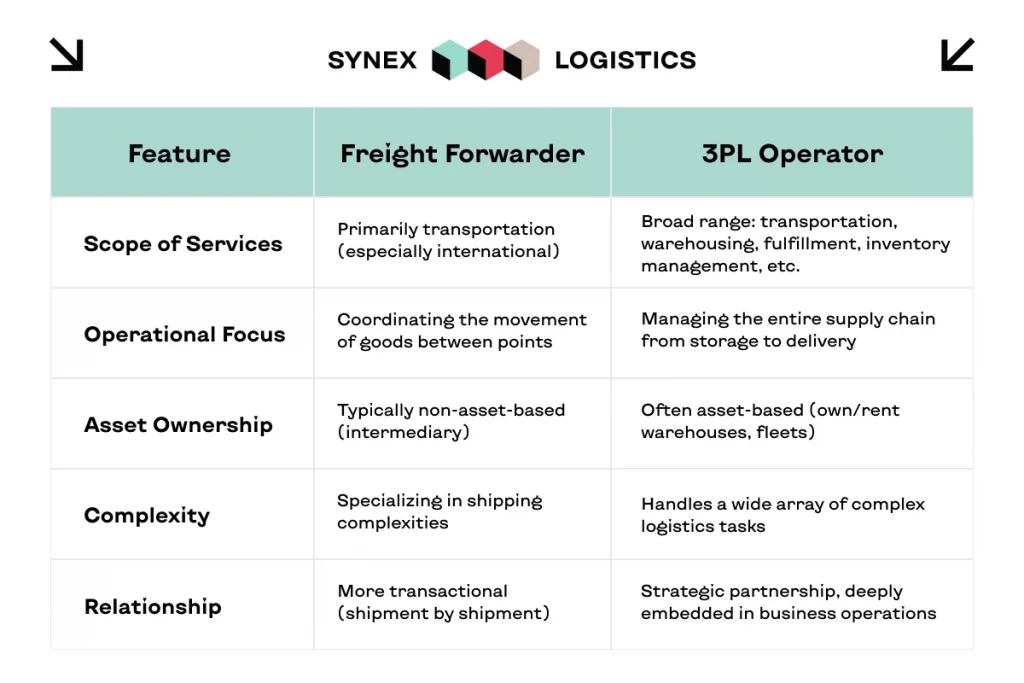Freight forwarder or 3PL operator — what to choose for your business?

The choice between a freight forwarder and a 3PL provider is one of the most important logistics decisions a business can make. Around 90% of Fortune 500 companies now rely on 3PL services to manage complex supply chains and scale operations efficiently. At the same time, the global market for freight forwarding continues to grow, especially across the Asia-Pacific region. Naturally, it indicates that many newer or smaller businesses still prefer traditional freight forwarding solutions.
At the end of the day, this is a key question for companies of all sizes: Which model is right for your business? Today, we’ll explain the difference between a freight forwarder and a 3PL logistics company and compare their advantages and limitations. Additionally, we will outline which types of businesses benefit most from each. We’ll also explore the selection criteria to consider when making your choice, and why modern, integrated providers like SYNEX Logistics often offer more value over time.
What is a Freight Forwarder?
A freight forwarder is a company that specializes in arranging the transportation of goods on behalf of a shipper. It does not move the cargo itself but acts as an intermediary between the shipper and the various transportation services, such as carriers, customs agents, and warehousing providers. The core function of a freight forwarder is to coordinate the logistics of cargo movement, ensuring that goods are shipped efficiently from origin to destination. This often involves booking cargo space, preparing documentation, handling customs clearance, and managing the flow of information throughout the shipment journey.
The foundation of freight forwarding lies in strong relationships with global and regional transport providers, as well as a deep understanding of regulations, tariffs, and documentation requirements in international trade. An international freight forwarder may handle shipments by air, sea, road, or rail, depending on what suits the route and cargo best. Though they typically don’t own transport assets, freight forwarder companies add value by orchestrating complex shipping processes, especially for businesses entering new markets.
Pros and cons of freight forwarding
A freight forwarder can be a helpful partner when your main goal is to move goods from point A to point B without handling the process yourself. But as soon as the business grows, the limits become visible. In short, freight forwarding solutions are built around transportation, not full-scale logistics. That is what basically defines its strong and weak points.
Advantages of a freight forwarder:
- Specialized knowledge in border-crossing procedures and trade compliance
- Established contacts with carriers in air, ocean, and land transport
- Ability to consolidate cargo and reduce transport costs per unit
- Freedom to select carriers based on price or availability
- Often helpful for ad hoc shipments or non-standard delivery needs
Disadvantages of relying on freight forwarding logistics:
- No responsibility for storage, fulfillment, or returns
- Lack of integration between transportation and inventory control
- Delays in communication due to the involvement of multiple intermediaries
- No long-term strategy for supply chain optimization
- Not designed to support scaling or automation across operations
Said risks require special considerations, like freight forwarders’ liability insurance. If you opt for this route, make sure to get insurance for all logistic operations.
What is a 3PL (Third-Party Logistics)?
A 3PL (third-party logistics) provider is a company that takes over a wide range of logistics tasks on behalf of a business. This can include transportation, warehousing, inventory management, packing, order fulfillment, and even returns. Unlike services that only arrange cargo movement, 3PL logistics companies become a working extension of your supply chain. They use specialized systems to connect logistics operations with your business processes, making it possible to manage the full flow of goods from the supplier to the final customer.
The core idea behind 3PL services is integration. A reliable 3PL logistics company doesn’t just move products—it builds a framework to support ongoing operations. Such a framework typically includes access to a 3PL warehouse, coordination with carriers, and connection to digital tools that track and manage shipments, stock levels, and delivery statuses. Many 3PL providers also offer developed services like 3PL ecommerce fulfillment or project-based logistics. Their services depend on what the client needs. The structure is designed to handle both day-to-day logistics and unexpected challenges.
Benefits of 3PL and its disadvantages
3PL logistics is built on consistency, specialization, and visibility. A business that works with a reputable 3PL provider gains access to a ready-made logistics infrastructure, physical and digital. Let’s take a closer look at its strong and weak sides.
Advantages of working with a 3PL logistics provider:
- Access to industry-specific logistics expertise and trained staff
- Real-time coordination between inventory levels and customer orders
- Smooth handling of regional distribution through strategically located 3PL warehouses
- Structured approach to inbound, outbound, and reverse logistics
- Transparent cost structure with clear service-level expectations
- Strong reporting tools for supply chain analysis and improvement
- Ability to support omnichannel retail and wholesale models
Disadvantages of using 3PL services:
- Limited control over warehouse layout or staff allocation
- Potential mismatch in communication styles or workflow pacing
- Need for internal staff to learn new tools and reporting systems
- Variability in service quality between different 3PL companies
- Fixed service packages may require negotiation for non-standard needs
As you can see, any of the said weaknesses are just a regular business like anywhere else. It is easily avoidable, whether by negotiation or choosing the 3PL company that suits you best.
What’s the Difference Between a Freight Forwarder and a 3PL?
As we discussed what these two logistic models have to offer for business, let’s now evaluate them side-by-side. For truly informed decisions, such a comparison can be extremely helpful.

Being completely honest, 3PL can serve as an umbrella term and include freight forwarding in itself. 3PL services are often considered the next evolutionary step in logistics operations. It offers all the same things a freight forwarder does, but is also able to cater to more complex tasks, like contract logistics.
Which logistics solution fits which business model?
The right logistics solution depends on how a business operates, how often it ships, and how many supply chain elements it wants to manage internally. A company that only needs help arranging transportation—such as booking vessels or dealing with border procedures—will often find a freight forwarder practical. In contrast, a company looking to build a structured, scalable supply chain that connects transport, storage, and order processing should consider 3PL logistics solutions.
Project-based businesses, seasonal exporters, or those shipping irregular volumes may benefit from the flexibility of freight forwarding services. A China freight forwarder, for example, is often enough for companies sourcing limited batches of goods from Asia with no need for warehousing abroad. This also applies to firms focused strictly on moving goods with their own in-house inventory systems.
However, businesses that manage regular stock flows, handle direct-to-customer delivery, or sell across multiple channels gain more from working with 3PL companies. These include e-commerce brands, distributors, and manufacturers who rely on precise stock control, fast shipping, and integrated data. With 3PL fulfillment, access to regional 3PL warehouses, and full transport logistics support, these businesses operate with fewer delays and greater control. 3PL providers are also better suited for companies expanding into new regions without local infrastructure, as they offer both strategy and execution under one roof.
What to consider when choosing a 3PL or freight forwarder company?
There is no one-size-fits-all answer, but the right questions will quickly point you in the right direction. Below is a short self-assessment to help identify which model fits better.
Ask yourself the following:
- Do you need help with both storage and transportation, not just shipping?
- Are you looking to automate order processing, tracking, and stock management?
- Does your business sell through multiple sales channels or markets?
- Do you need access to a 3PL warehouse or a regional distribution center?
- Would your operations benefit from outsourced returns and customer delivery?
- Is your team lacking the internal resources to manage the full logistics cycle?
- Are you planning to scale your logistics without investing in infrastructure?
- Do you need a logistics partner that can offer long-term planning and full transport logistics support?
- Is consistency across warehousing, fulfillment, and transport a current challenge?
More “yes” answers suggest your business would gain from working with 3PL providers, such as SYNEX Logistics. If you answered “no” more often, a freight forwarding service may be sufficient at this stage.
Why SYNEX Logistics – the best 3PL solution for businesses with global reach
SYNEX Logistics offers U.S.-based companies a powerful gateway to global markets through fully integrated 3PL logistics solutions. Our focus regions include Asia Pacific and Europe—two of the most dynamic trade zones for American businesses. Our 3PL warehouses in China, India, Central Asia, and the EU ensure fast, coordinated delivery across key markets. With us, you avoid common issues like delayed clearance, poor tracking, or scattered providers. From 3PL ecommerce fulfillment to complex B2B flows, we keep every part of your supply chain connected. Contact SYNEX Logistics to scale globally with confidence.

Conclusions
Freight forwarding still plays a key role in international trade, especially for businesses with simple transport needs or occasional cross-border shipments. It helps manage cargo movement and paperwork, and often suits companies that prefer to control other logistics tasks themselves. But once operations expand—more orders, more destinations, more complexity—the gaps begin to show. That’s when the difference between a freight forwarder and a 3PL logistics company becomes more than technical—it becomes strategic.
A strong 3PL provider covers what freight forwarding services alone cannot: full coordination across transport, storage, fulfillment, and system integration. It brings structure where forwarders bring coordination. For companies with long-term plans and global ambition, 3PL logistics solutions unlock consistency, visibility, and scale. In that sense, 3PL is not just an alternative to freight forwarding—it is the evolved form of it. SYNEX Logistics builds this kind of system, not around limitations, but around growth.




